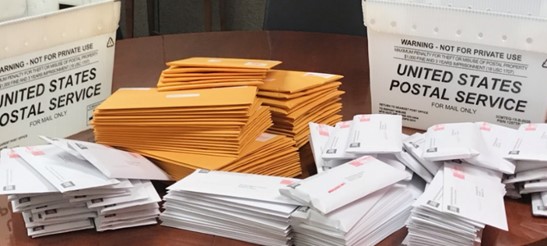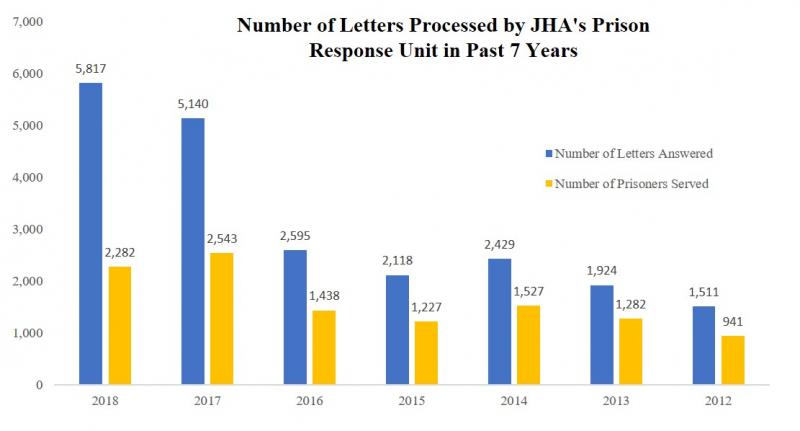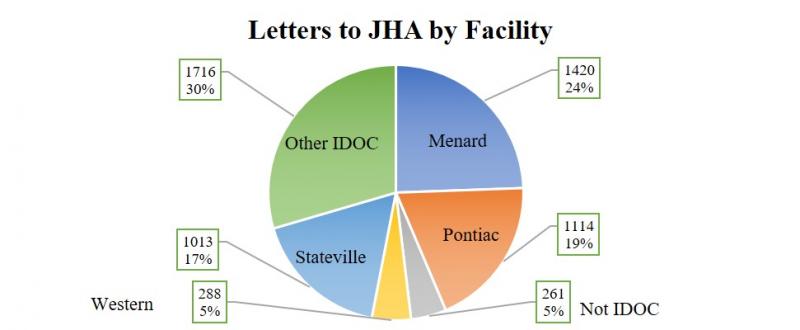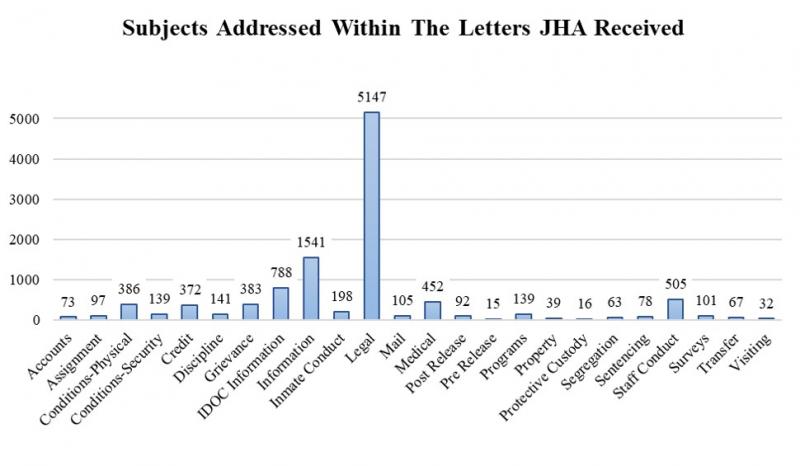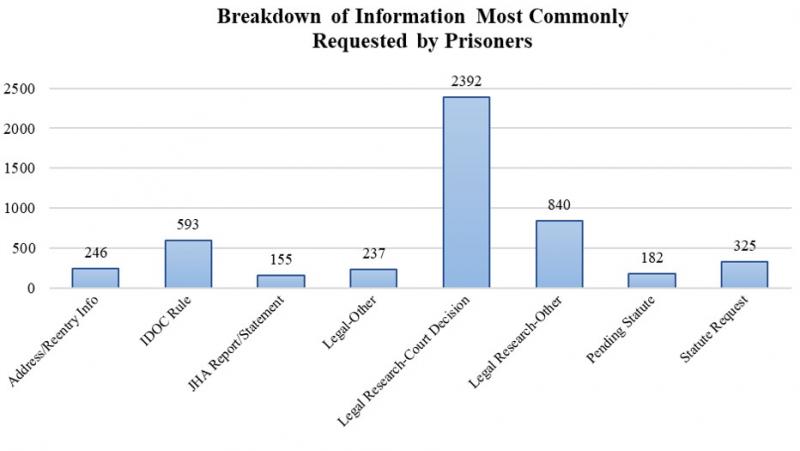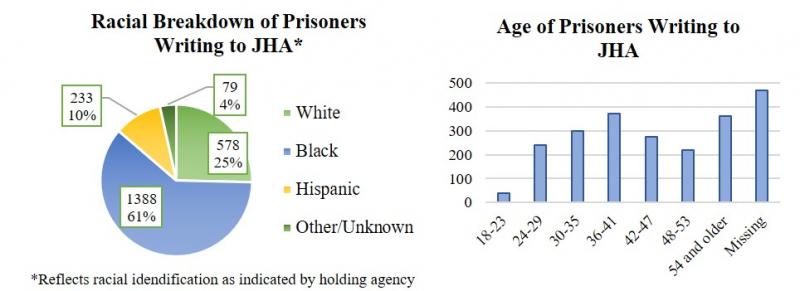Prison Communications 2018
John Howard Association’s Prison Response Unit (PRU) provides information to prisoners because they are often cut off from obtaining materials and data from reliable sources.[1] The information services we provide include responding to questions about a wide range of criminal justice related subjects; answering questions and providing information about correctional policies and rules specific to the Illinois Department of Corrections (IDOC); and providing documents otherwise unavailable, including but not limited to court decisions, information packets about civil and criminal rights, laws, legislative information, state agency-issued reports, and documents filed in litigation. JHA’s PRU tracks and codes information contained within the letters received for use in our monitoring and advocacy efforts
During 2018, JHA processed[2] 13% more letters than the year prior: a total of 5,817 letters from 2,282 individuals who were housed in a prison or jail. Additionally, JHA received and responded to more than 815 calls and emails from people in the community.
Much of the PRU’s work during 2018 was dedicated to filling an information vacuum that exists within prisons and jails that adversely impacts prisoners. Our 2018 letter data suggests that IDOC’s maximum security prisons greatly struggle to meet the informational needs of prisoners; 60% of 2018’s letters came from Menard, Stateville, and Pontiac. Most of these letters were requests for legal materials, information related to statutes, and even IDOC rules, the latter of which is information that should be made readily available to prisoners within IDOC by IDOC itself. JHA is firmly dedicated to providing prisoners with critical statutory, legal, and reentry related information that they would not otherwise be able to obtain if not for JHA. However, as the quantity of letters and need for information has increased to an average of 130 letters/week, program funding and staffing have not. JHA currently lacks the resources to process all of the mail from prisoners we receive. Given the significant impact we know this program has on prisoners, JHA is actively seeking partners in our letter response work. JHA strongly emphasizes, however, that most of these letters are requests for information that should be provided by IDOC and the other law enforcement entities holding these prisoners.
Following an upward trend that began in 2016, the PRU’s work in the area of prisoner information services again increased in 2018. Of the letters from prisoners JHA responded to this past year, 80% (4,658) required an information packet in addition to a response letter – thus incurring additional stationery, printing/copying and postage costs. By comparison, 65% of JHA’s responses to letters contained an information packet last year.
JHA spends between $100-$250 weekly on postage for these responses, in addition to the cost of stationery, printing/copying, and administrative expenses. Due to this program’s rapid growth, a current week’s costs equals expenditure over a six-month period just a few years ago. Without adequate resources, we will be unable to continue to provide Illinois’ prisoners with the critical information they are seeking and the individual response that recognizes our common humanity.
The following data is a summary of the correspondence from prisoners answered by JHA during the 2018 calendar year:
The PRU mainly provides services to prisoners held by IDOC. However, JHA also responds to prisoners held by other law enforcement entities located throughout the United States. This is reflected by the “Not IDOC” category in the graph above, which includes facilities such as county jails, federal facilities, or facilities in other states. The “Other IDOC” category is composed of all IDOC facilities other than the four most frequently heard from IDOC facilities in 2018 (Menard, Pontiac, Stateville, and Western), which were also the most frequently heard from in 2017.
JHA codes letters by issues raised or the type of information requested by prisoners. A single letter may raise multiple issues or contain requests for several types of information; thus, the total numbers in the chart above exceed the number of letters processed. The top three codes for 2018 were Legal, Information, and IDOC Information, with Staff Conduct coming in fourth. The chart below goes into more detail on the most common types of information that JHA provides. Please see the glossary at the bottom of this article for more detailed definitions of categories.
Demographic Characteristics of Prisoners that Wrote to JHA in 2018
Race: The racial breakdown of prisoners that wrote JHA in 2018 is representative of IDOC’s population where race as a demographic factor is concerned.
Age: According to IDOC[3], the average age of prisoners is 38. As the graph above indicates, more prisoners older than 38 write JHA in comparison to prisoners that are 37 or younger.
Gender: We receive few letters from female prisoners. Approximately 1% of prisoners writing JHA are female, while 6% of IDOC’s population is female.
Code Glossary
Accounts: Commissary, Inmate Trust Account, Inmate Benefit Fund, State Pay, Indigent Status
Assignment: Cell Assignment, Job Assignment, Classification
Conditions-Physical: Temperature, Water, Food, Clothing, Sanitation, Overcrowding, etc.
Conditions-Security: Lockdowns, Security Related Operations, Searches, etc.
Credit: All forms of sentencing credit this is awarded or revoked by IDOC
Discipline: Issues related to inmate disciplinary process
Grievance: Issues related to the process by which people imprisoned attempt to have problems resolved by correction officials
Inmate Conduct: Complaints from one inmate about another inmate(s)
IDOC-Information: IDOC Rules, Department data, IDOC reports, etc.
Information: Requests for a wide range of materials, including JHA reports, articles, resource guides, etc.
Legal: Requests for printouts of court decisions and statutes, legal information, legal forms, etc.
Mail: Issues related to mail delivery to and from prisons/jails
Medical: Complaints as to quality of care received or lack of care
Post-Release: Door violators, host site approval, Mandatory Supervised Release (MSR, or parole) violations, MSR conditions, etc.
Pre-Release: Adult Transition Centers (work release), Electronic Detention, etc.
Programs: Educational programs, lack of educational programs, treatment programs, etc.
Protective Custody: Inmate requests to be specially housed and concerns related to protective custody practices
Segregation: Administrative detention, privileges/lack of privileges while housed in disciplinary unit, etc.
Sentencing: Questions and concerns related to how an inmate’s sentence is being calculated, and how IDOC is classifying his/her offense
Staff Conduct: Complaints as to staff not following rules and disagreements with staff implementation of discretionary authority
Surveys: Submission of JHA survey form by mail, questions about survey.
Transfer: Requests from inmates to be transferred to another prison, have security classification reduced, serve MSR term out of state, etc.
Visiting: Issues related to prison visiting rooms and restrictions, plus telephone contact
Sub-Code Glossary
Addresses/Re-entry Info: information related to re-entry, and addresses of direct service providers, legislators, etc. (Personal addresses are never provided.)
IDOC Rule: Mostly parts of the IL Administrative Code applicable to IDOC, also referred to as Department Rules (DRs)
JHA Report/Statement: Facility and topical reports created by JHA, survey results, and official statements.
Legal-Other: Court rules, court forms, and self-help guides pertaining to the legal process
Legal Research-Court Decision: Published court decisions from state and federal courts
Legal Research-Other: Law review articles, updates on pending litigation, etc.
Pending Statute: Information related to legislation that has not become law
Statute Request: Current laws and archival versions of laws
[1] By law individuals incarcerated in Illinois within county jails or the Illinois Department of Corrections (IDOC) may send privileged mail to the John Howard Association of Illinois (JHA). “Privileged mail” simply means that mail marked as such can be sent to or from a prison or jail in Illinois sealed and unread by correctional staff. “Privileged mail” does not mean it is a legal communication; correspondence between an attorney and their client is “legal mail.”
[2] A letter is considered processed after JHA has responded to the letter and information related to the letter has been entered into JHA’s database for letters.
